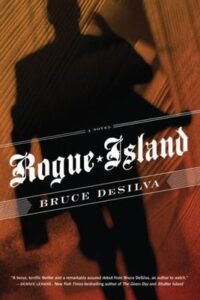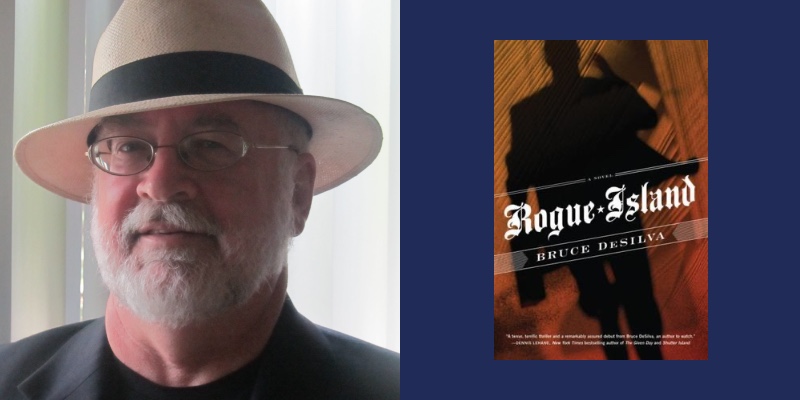“For most of my career as a journalist writing a novel was not something that occurred to me,” says Bruce DeSilva. Not until, that is, he received a note from Evan Hunter, better known by his pseudonym, Ed McBain, encouraging DeSilva to turn a short story into a book. And even then, with the note laminated next to his computer staring him in the face every day—and long after a divorce, job changes, and early retirement—DeSilva didn’t get around to writing it for sixteen years.
Like he said, writing a novel was not something that had occurred to him.
And while the real estate taken up on his desk acknowledges the gravity DeSilva gave Hunter’s note, DeSilva didn’t comprehend its significance until he dined with Otto Penzler. Penzler is the owner of the famed Mysterious Bookshop in Lower Manhattan—the oldest mystery bookstore in America.
“We kind of hit it off,” DeSilva says. “Otto, too, had started his career as a journalist.” Over dinner, DeSilva told Penzler about the note from Evan Hunter:
Dear Bruce,
MALICE is a nice little story. In fact, it could serve as the outline for a novel. Have you considered this?
Best,
Evan
Penzler dropped his fork on his plate. “Really?”
“Yes.”
“Evan Hunter sent you that note?”
“Yeah.”
Penzler, who lunched frequently with Hunter, was skeptical. He’d never heard his friend compliment anyone on their writing.
“Well then, you’ve got to finish it,” Penzler said.
“If he hadn’t sent me that note, I never would have thought to write a novel,” DeSilva says. Six months after dinner with Penzler, he finished his draft of Rogue Island and sent it to him. Two weeks later Penzler responded. “Who’s your agent?”
“I don’t have one,” DeSilva emailed him.
“Well, let me take care of that for you.” Penzler introduced him to Susanna Einstein who became his agent.
But let’s digress a bit. How did Bruce DeSilva ever link up with Evan Hunter, a.k.a. Ed McBain, in the first place?
After college, DeSilva worked at the Providence Journal filling in for vacationing news staffers. He expected to go on to graduate school in the fall, but instead never left the profession, becoming a journalist for the next 42 years. As a cub reporter, he covered the little town of Warren, Rhode Island. Then he covered the night cop beat before moving on to investigations and long-form stories.
He switched to the Hartford Courant—the nation’s oldest continuously published newspaper. When the Los Angeles Times purchased it, the Courant was a sleepy newspaper, he says, and the Times wanted it to rival the Boston Globe. With the Times’ blessing, he became a roaming reporter, first covering New England and then becoming the paper’s first national writer. He also wrote for the Sunday magazine (back when there were such things at daily newspapers) and began interviewing famous crime writers.
“I always liked crime fiction. I’d probably read 2,000 crime novels,” he said. “I had a love of the genre.”
Among those he interviewed were Robert B. Parker (Spenser series), Evan Hunter (writing as Ed McBain) and Greg McDonald (Fletch series).
He says McDonald writes some of the best dialogue outside of early George V. Higgins (The Friends of Eddie Coyle). “His novels were humorous but were serious about taking on sacred cows,” DeSilva says.
And as for the other two, “Hunter and Parker were so thoughtful about their work and how they did what they did. They’re quite different from each other and I learned a lot from them. I didn’t realize at the time I would put it to use later.”
For his magazine interview with Hunter, DeSilva visited him at his home. Hunter had a small office built in his backyard. They met at 9 a.m. for a scheduled half-hour interview. Around noon, Hunter’s wife came out to check on them.
“Will our guest be staying for lunch?”
Six hours later, she returned, “Will he be staying for dinner?”
DeSilva didn’t leave until 9 p.m.––a twelve-hour interview. He had read all of Hunter’s books and “there was so much to talk about.”
Not long after, Hunter wrote him about a short story DeSilva had published in the Hartford Courant Sunday magazine about a newspaper reporter investigating a government scandal. He suggested DeSilva turn it into a novel. Encouraged that one of America’s most popular crime novelists would take interest in his writing, DeSilva immediately began getting up early each morning to write for an hour and write again late at night.
And then life stepped in the way. He was tasked with remaking the Courant into a livelier read, got divorced, and finally took a position as news features editor with the Associated Press in New York City where he had 25 journalists reporting to him. There, he also started writing occasional book reviews. He became more important to book publicists as newspapers around the world started cutting back on their own reviews. (The AP recently announced it has ceased syndicating book reviews altogether due to low readership on its website and also as a cost-cutting measure.)
He rebuilt the features department and later became an AP worldwide writing coach. From his perch inside the news business, he began to notice the decline of print media before it started to seriously erode. He decided it was time to take early retirement.
“Four years before I left, I started to think about what was next.” For him, it was writing crime fiction. “I generally tell people I didn’t leave journalism, it left me.”
This being his first book and not knowing any better, DeSilva sent blurb requests to fifteen famous crime novelists before he had a book contract. He sent copies of his manuscript that he’d made at Staples to Dennis Lehane whom he knew, as well as pleas to Joseph Finder, Harlan Coben, Michael Connelly, Ace Atkins, Ken Bruen, Penzler, James W. Hall, Tim Dorsey and many more. “I hoped one or two might write blurbs.” All but two did.
“I had thirteen blurbs for the book. The only problem was, I didn’t have a book.” Later, when he did, he had to call several authors to apologize there wasn’t enough space for their blurbs.
Einstein sold Rogue Island to Forge (MacMillan), and it was published in 2010. The first thing readers see when they open the novel is the note from Hunter. You then begin to read about life-on-the-streets investigative reporter Liam Mulligan who notices that a number of fires in Providence, Rhode Island seem similar. As he investigates, he starts getting pushback from public officials until he is accused of lighting the match himself.
Rogue Island is a noir crime novel that shines a light on the dying newspaper business. “One of the things I always love about many crime novelists I read is they use the form to address serious issues,” DeSilva says. “The question on my mind was the decline of the newspaper industry and what it was doing to American democracy. I thought it was going to be a catastrophe, and it has been.”
Hundreds of newspapers have closed in recent years. “Local and state government corruption has always been a problem. Imagine what’s going on now when no one’s paying attention. I wanted to address that subject in a way that would be read. It has to be done without beating people over the head with it, so it’s in the background.”
For his first novel, DeSilva funded his own U.S. book tour. When Forge realized how much effort he was putting into it, they picked up some of the cost. “Which was nice,” DeSilva says. “They weren’t originally going to do that.”
Like most debut novels, sales were mediocre, but in DeSilva’s case, recognition was not. Rogue Island won an Edgar Award for best debut novel from the Mystery Writers of America and a Macavity Award from Mystery Readers International.
“By the time the Edgars were announced I felt a part of that very supportive community. Not all writing communities are like that. I’ve read stories of the science fiction writers being at each other’s throats, and the romance writers hating each other.”
Michael Connelly handed him the Edgar. “As someone who is used to being around famous people, I felt starstruck at that moment.”
After his Edgar win, Rogue Island sold out. But Forge did not immediately go back to press. By the time it finally did, the awards bump was long over. “My agent is still angry with the publisher.”
“Forge did not keep its promises,” DeSilva says. For his second book Forge’s promotions department did not follow through on arranging his book tour. He called the bookstores on the tour list, and they had never heard from Forge, so he set it up himself.
And for his third book, his editor never responded to his manuscript submission. After six months, his agent called the top Forge executive. and discovered his editor had left the company. The publisher apologized and gave DeSilva a six-figure, three-book deal in recognition of its oversight.
But with each novel, problems persisted, the promotions department repeatedly failing to do things it promised. DeSilva addressed the issue directly for his fifth book, vowing to take on whatever publicity the publisher didn’t.
“The head of publicity took offense at what she perceived as criticism of her department,” he says. “She refused to even assign a publicist for the book. It was really a nightmarish time trying to get any type of promotion out of Forge. And it happened while I was getting great reviews.”
Welcome to the circus called book publishing.
Starting with Rogue Island, DeSilva always did what he could on his own to promote his novels. Among other efforts, he photographed dozens of famous people reading his books, including actor John Lithgow, blues musician Taj Mahal, former Washington Post Columnist Eugene Robinson, and heavy metal rocker Marilyn Manson.
Famed poet Patricia Smith, who just happens to be his wife, a Princeton professor, Gugenheim Fellowship recipient, finalist for the National Book Award, and international speaker (including at the Sorbonne in Paris), chipped in by photographing actors Viggo Motensen and Amber Tamblen.
“She’s the Aretha Franklin of reading poetry,” DeSilva says of his wife. He laughs and notes he’s often asked, “What’s it like being the second-best writer in the family?”
The Wall Street Journal was so interested in DeSilva’s marketing idea, it ran a story citing his efforts.
During his years of book tours as a novelist, DeSilva once learned of a famous fan when he was doing a book signing at Once Upon A Crime in Minneapolis. At the end of a long line of autograph seekers, a friend of the store owner asked DeSilva if he would sign his book for Bob Dylan.
“The Bob Dylan?” DeSilva asked.
“Yes, he’s a friend of mine. He loves your books, and he wants you to sign it for him.”
“I said, ‘you’re gotta be punking me.’ I looked at the storeowner, and she assure me it was true. ‘His friend comes in every now and then to get a signed book for Bob,’ she said.”
DeSilva says his writing career has been “like getting hit by lightning.” Not bad for a guy who took a book tour from his original plans of grad school. “I took it as an acknowledgement of my deciding to do something different with my life.”
He’s not the only one.

___________________________________
Rogue Island
___________________________________
I want to be a writer: I was 22 and supposed to go to graduate school, but the summer after I completed my B.A., I took a vacation relief job as a reporter at The Providence Journal. Loved it. Never looked back.
Experience: 42 years as a print reporter, editor, and writing coach, specializing in investigations, explanatory journalism and narrative storytelling at The Providence Journal, The Hartford Courant, and The Associated Press. Reviewed hundreds of books, mostly for AP. Occasionally for other pubs including The New York Times Book Review. Taught narrative storytelling at the Columbia Graduate School of Journalism.
Agents Contacted: One
Agent Responses: One
Agent Search: About a week
Time to Sell Novel: Four months
First Novel Agent: Susanna Einstein
First Novel Editor: Eric Raab
First Novel Publisher: Forge
Inspiration: Journalism
Advice to Writers: Don’t tell yourself you are waiting for the right time. It may never come. Don’t tell yourself you’re too busy. It’s a lie. Can you write 500 good words five days a week? Stick to that goal and you’ll have 100,000 words in less than a year.
Website: Defunct. Find me at my blog.

















